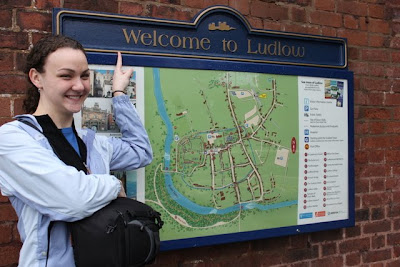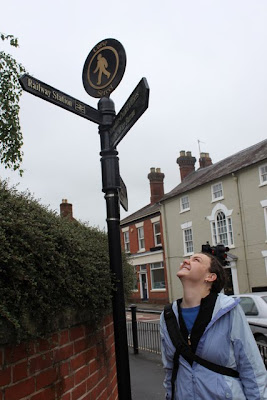I got back from England a couple of months ago. What an experience! While in England I worked at the Gloucestershire Archives. It was amazing! First of all, I don't think that I have ever met more friendly people before. They were absolutely the best. Not to mention all of the fun things they let me help with. I got to handle documents with things like this:

While at the archive, I worked on a few projects. I helped extract information from a collection of land records (like the pictures above). That was one of my favorite projects because I got to spend so much time practicing reading old handwriting. My other project involved organizing and cataloging a previously uncataloged collection. When I received the documents, they were just a bunch of lose papers in a box. When I was done, they looked like this:

I was proud of the outcome! They even taught me how to package the documents in a way that would best preserve them. It was a lot like wrapping presents!
One of the most exhilarating experiences at the Cathedral was climbing the 239 winding, narrow, stairs to the top of the tower at 225 feet. On the way up, we were able to stop and hear the bells ring while being in the bell tower. There is one bell, the three ton Great Peter, which is England’s only remaining medieval great bell. It was hard to imagine the amount of work and the length of time it would have taken for such a big bell to be put into place.
I was also able to hear the choir practice while I was there. The acoustics were amazing and they sounded like angels. I gained a better understanding of English culture by being so up close and personal with the people and their history that surrounds them daily. The Cathedral is still used for Sunday services, and that simple fact showed that England’s past is still very much connected with their present. Every aspect of my time in England was educational and beneficial. It was a great opportunity.

When I wasn't at the archive, I was able to travel to Bath to see the Roman Baths! Other than it being a cold an rainy day, it was a great trip. It was so fun to be in a place whose history dates back so much farther than we can experience here. I constantly felt that I was surrounded by history. It was great!







 The real bonus of being in Chester was the opportunity of seeing the best preserved example of the Bishop's Court (also called Consistory Court) as depicted here. Other than the lighting fixture everything in this room was as it would have been when our 18th century people brought their grievances or wills to prove to the court.
The real bonus of being in Chester was the opportunity of seeing the best preserved example of the Bishop's Court (also called Consistory Court) as depicted here. Other than the lighting fixture everything in this room was as it would have been when our 18th century people brought their grievances or wills to prove to the court.







 We had our own taste of interminable journeys on the bus journey to and from Liverpool. On the way there we were delayed by the bus breaking down and, once we got on the replacement bus, getting stuck behind a Roma horse-drawn wagon. Then once we wanted to leave Liverpool, the bus, which was supposed to come every 20 minutes, didn't come for an hour. We were entertained, however, by the increasingly drunken football revellers making their way to the pubs to watch the England-US World Cup match. The trip home was also slower than expected. Once again we were glad to be on modern conveniences because if this had been the 19th century the Donner Party overtones would have been disconcerting.
We had our own taste of interminable journeys on the bus journey to and from Liverpool. On the way there we were delayed by the bus breaking down and, once we got on the replacement bus, getting stuck behind a Roma horse-drawn wagon. Then once we wanted to leave Liverpool, the bus, which was supposed to come every 20 minutes, didn't come for an hour. We were entertained, however, by the increasingly drunken football revellers making their way to the pubs to watch the England-US World Cup match. The trip home was also slower than expected. Once again we were glad to be on modern conveniences because if this had been the 19th century the Donner Party overtones would have been disconcerting.  Now for the feces (faeces in British) portion of our story. At the Maritime Museum at the Albert Dock they had a display on customs officers. One station demonstrated how customs officials must be very vigilant in deciphering pure imported goods from those cut with cheap materials. For example, the difference between genuine tea leaves from grass clippings often mixed with tea leaves to increase, illegally, the profits of the seller. Well, apparently some clever smugglers mix legitimate goods with fecal matter. But that's not the best part. The best part is the fact that the museum chose this item, not grass clippings, to use in the display - with the encouragement to smell the faeces to determine if you could tell the difference between that and coffee. Really? We abstained from participating in this demonstration; we decided that learning we couldn't tell the difference between poo-poo and coffee would be a distressing things to learn.
Now for the feces (faeces in British) portion of our story. At the Maritime Museum at the Albert Dock they had a display on customs officers. One station demonstrated how customs officials must be very vigilant in deciphering pure imported goods from those cut with cheap materials. For example, the difference between genuine tea leaves from grass clippings often mixed with tea leaves to increase, illegally, the profits of the seller. Well, apparently some clever smugglers mix legitimate goods with fecal matter. But that's not the best part. The best part is the fact that the museum chose this item, not grass clippings, to use in the display - with the encouragement to smell the faeces to determine if you could tell the difference between that and coffee. Really? We abstained from participating in this demonstration; we decided that learning we couldn't tell the difference between poo-poo and coffee would be a distressing things to learn.
 While the disputes are interesting as examples of family and financial conflict, they are also full of incidental details that surprise, entertain, and educate us. B fell in love with a man's estate inventory that listed, by title, each of his massive amount of books. K found a will forged by what could only have been the dimmest forger ever to appear before the diocesan court. He went to all the trouble to forge a will, witnesses and all, but then dated it for nine days after the death of the testator. That will was truly from beyond the grave. I was intrigued by the woman, who when her husband died married her servant. She had five children and all of his and her labor went to their upkeep. When the servant husband died, someone tried to sue her to get money from his estate. She claimed poverty because he had been a day laborer and because she still had to support his two, uh, spurious children. He sounds like a real catch.
While the disputes are interesting as examples of family and financial conflict, they are also full of incidental details that surprise, entertain, and educate us. B fell in love with a man's estate inventory that listed, by title, each of his massive amount of books. K found a will forged by what could only have been the dimmest forger ever to appear before the diocesan court. He went to all the trouble to forge a will, witnesses and all, but then dated it for nine days after the death of the testator. That will was truly from beyond the grave. I was intrigued by the woman, who when her husband died married her servant. She had five children and all of his and her labor went to their upkeep. When the servant husband died, someone tried to sue her to get money from his estate. She claimed poverty because he had been a day laborer and because she still had to support his two, uh, spurious children. He sounds like a real catch. The archives close at 5pm, but the sun doesn't set until 10pm. So, we stroll around Chester viewing the lovely Tudor-Stuart architecture and pleasantly squabbling about where to eat dinner. (A piece of advice, avoid the Mexican food in Chester.)
The archives close at 5pm, but the sun doesn't set until 10pm. So, we stroll around Chester viewing the lovely Tudor-Stuart architecture and pleasantly squabbling about where to eat dinner. (A piece of advice, avoid the Mexican food in Chester.)